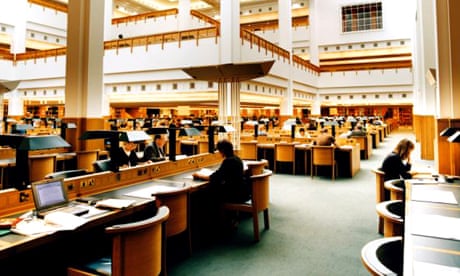If it is information on the health of medieval women or the battle of Trafalgar you require, then the British Library is a pretty good place to look. But those wanting to shed light on more recent events or discoveries recorded online could be in trouble.
Digital literature, online scientific research and internet journalism that should have been saved in the nation's main libraries over the past five years may have been lost because ministers have failed to give them the legal power to copy and archive websites, the Guardian has learned.
Senior executives at the British Library and the National Library of Scotland (NLS) are dismayed that legislation giving them the right to collect online and digital material is still not in force, more than six years after it was passed by parliament.
The omission has meant the libraries – which are legally required to archive books, newspapers and journals – have failed to record online coverage of major events such as the Iraq and Afghanistan wars, the release of the Lockerbie bomber and the MPs' expenses scandal.
The Department for Culture, Media and Sport has admitted that the powers, set out by the Legal Deposit Libraries Act 2003, will not become law before the next election, after a series of delays in getting proposals from an advisory panel and hold-ups in Whitehall.
The legislation was heralded in 2003 as evidence that Britain was at the forefront of the digital media revolution. It meant that "a vital part of the nation's published heritage will be safe", said Chris Mole, the Labour MP, now a junior transport minister, who introduced it as a private member's bill.
It gave six libraries – the British Library, the NLS, the National Library of Wales, the Bodleian in Oxford, Cambridge University Library and Trinity College Dublin – the same legal authority to collect digital material that they have for printed works.
Copies of every book, journal and newspaper printed in Britain must by law be deposited in one of these libraries. Once the new powers come into force, the same rules would apply to digital publications, under a system known as electronic legal, or e-legal, deposit.
At least 26 other countries, including France, Germany, Canada, Denmark, Finland, New Zealand and Norway, now have similar laws in force.
Phil Spence, head of operations at the British Library, said the failure had left a major "digital black hole" in the library's collections, with huge gaps in the archives for researchers, scientists and historians.
It meant the British Library was unable to store the BBC's website, the National Gallery or British Museum website, any UK newspapers' websites, or scientific journals published online because of copyright issues. Blogs, community pages, government and business websites can only be archived after laborious voluntary agreements. The act would protect the libraries against copying defamatory material, but would also protect a publisher's copyright.
"We've lost five years of digital content which is gone potentially for ever, and the ability of the nation to capitalise on that as well," he said.
Spence believes this raises questions about the multibillion-pound "digital Britain" initiative to improve the broadband network, increase digital broadcasting and promote "digital inclusion".
"We're failing to create intellectual capital and the knowledge economy because of this digital black hole," he said.
Martyn Wade, the head librarian and chief executive of the NLS, said: "We're missing the birth of a new way of publishing. We've lost six years of Scottish digital history, which can't be replicated, and we continue to lose that history with every month we don't have this legislation."
The British Library and NLS have had to broker voluntary deals to archive some websites, or introduce one-off "sweeps" of major events, such as the 7 July bombings of London. A deal with the Scottish government and parliament to "harvest" their websites has only just been signed.
"Our frustration is that Britain was one of the first countries in Europe and possibly the world to recognise the issue and pass legislation," said Wade.
Don Foster, the Liberal Democrat MP, said he would press Margaret Hodge, the culture minister. "It is unbelievable that this critical venture could be hampered not by a lack of funding, but by a lack of enthusiasm from the government."
A ministry spokesman said: "Establishing new regulations on e-deposit is a hugely complex task where the interests of many different stakeholders have to be considered, and where technology is racing ahead."

Comments (…)
Sign in or create your Guardian account to join the discussion